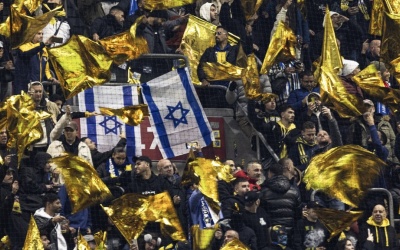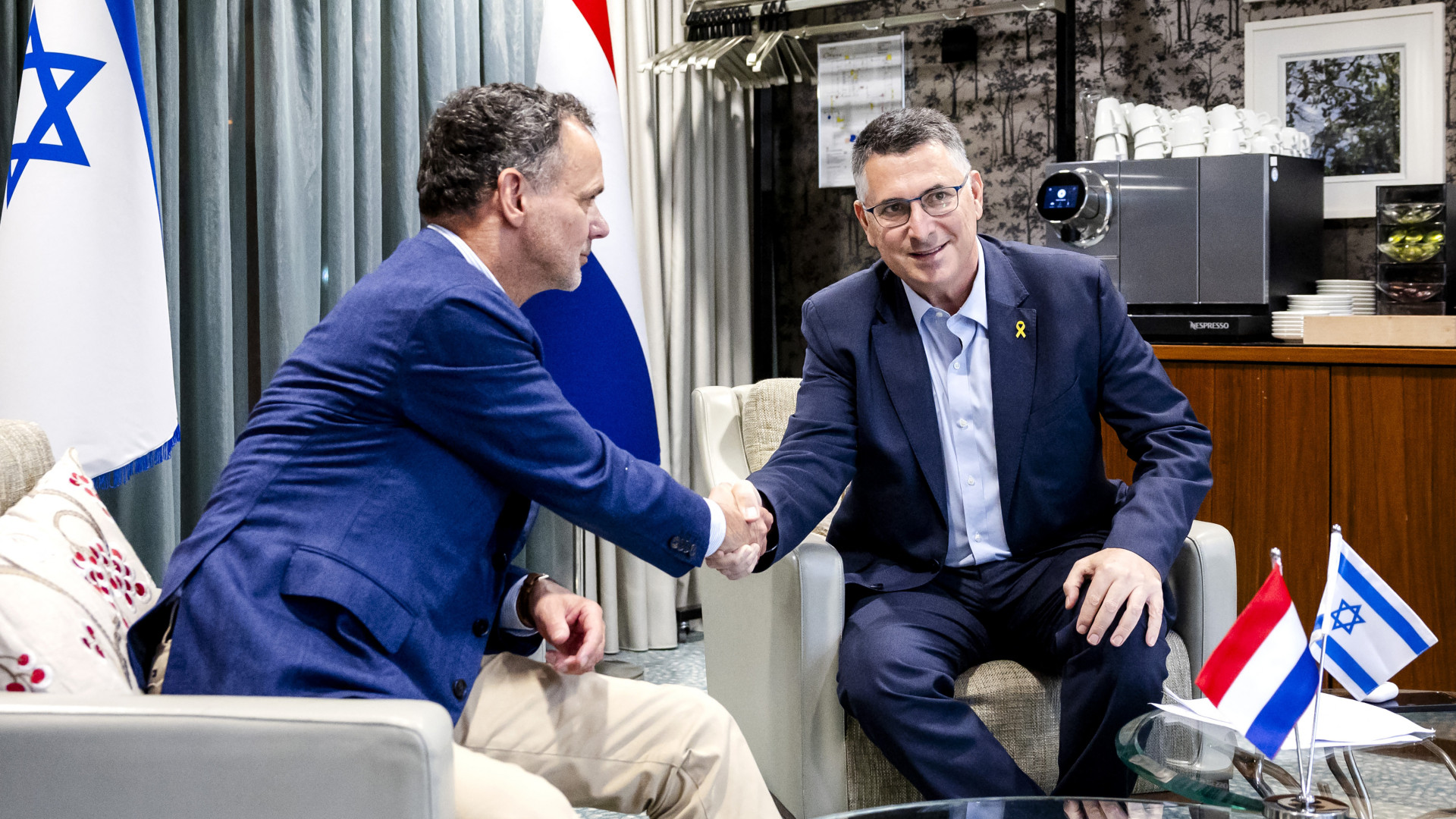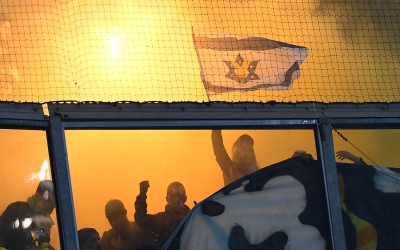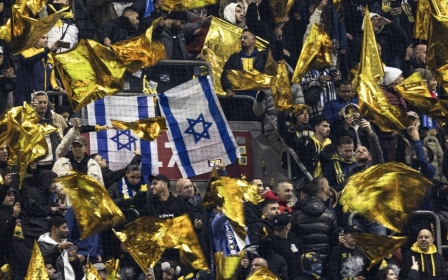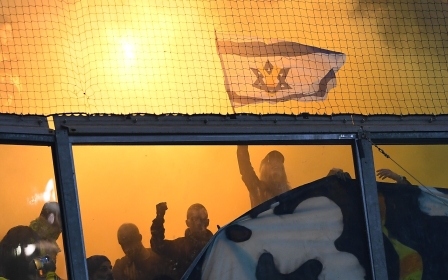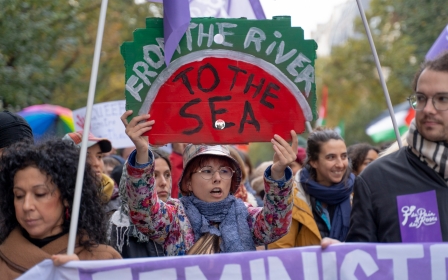Why Dutch support for Israel's football hooligans has roots in colonial racism

Late last week, the western world was aghast at the alleged "antisemitic attacks" in Amsterdam targeting Israeli football fans, injuring 10 of them.
King Willem-Alexander of the Netherlands swiftly condemned the attacks, which he claimed were reminiscent of "dark and grim times for the Jewish people", and vowed not to "turn a blind eye to antisemitism" amid mass arrests.
The king does not seem to consider it antisemitic, however, to equate Israeli football hooligans with the entire Jewish people, or at least with all Dutch Jews, let alone to compare clashes between football fans and anti-genocide demonstrators to the Holocaust.
During a phone call with Israeli President Isaac Herzog on Friday morning, the king further affirmed: "We failed the Jewish community of the Netherlands during World War Two, and last night we failed again."
It is unclear whether the king was referring to the antisemitic Dutch riots that targeted Amsterdam Jews after the Nazi occupation, especially in February 1941, or the Dutch police's collaboration with the Nazis in rounding up and deporting Dutch Jews.
New MEE newsletter: Jerusalem Dispatch
Sign up to get the latest insights and analysis on Israel-Palestine, alongside Turkey Unpacked and other MEE newsletters
Post-war Dutch authorities and public culture often neglect to mention the extent of Dutch collaboration with the Nazis while their country was under occupation.
Collaborating with the Nazis, as in the case of at least 300,000 Dutch citizens, including a private network of "Jew hunters", is, of course, quite different from the king's reference to the Dutch simply "failing" to protect the Jewish community.
Even the cognitively diminished US President Joe Biden, who lacks any originality, issued a statement parroting the words of the king that the attacks "echo dark moments in history".
French President Emmanuel Macron also "firmly condemned" the "violence against Israeli citizens in Amsterdam", stating that it recalled "the most shameful hours in history". He later announced his plan to attend a Uefa Nations League event in Paris to "send a message of fraternity and solidarity after the intolerable antisemitic acts".
'Pogroms'
Western leaders have gone apoplectic about the "pogrom", with many mimicking the Israeli mainstream's description of the 7 November events.
One of the Israeli hooligans' popular chants celebrated the annihilation of tens of thousands of Palestinian children in Gaza
The Jerusalem Post, a right-wing Israeli newspaper, referred to the brawl as the "Amsterdam pogrom" and compared it to Kristallnacht, while the left-wing Israeli journalist Gideon Levy joined the chorus, saying it was an "ugly, criminal pogrom", even if he also compared it to actual daily settler pogroms in the West Bank, which the western press ignores.
Following the chaos in Amsterdam, the Dutch police pledged that "security will be beefed up at Jewish institutions across the city, which has a large Jewish community".
One is at a loss: did the alleged attacks target the Amsterdam Jewish community, its homes, synagogues, cemeteries, and businesses, or was this a clash between Israeli football hooligans who support genocide and racism and Dutch opponents of the genocide?
According to The New York Times, prior to the clashes, Israeli fans who were in town for a football match between an Israeli and a Dutch team in which the Israelis lost were captured on video shouting racist "anti-Arab chants on their way to the match".
One of their popular chants celebrated the ongoing genocide of the Palestinians and the annihilation of tens of thousands of Palestinian children in Gaza, with the crowd repeating: "Why is there no school in Gaza? There are no children left there."
Follow Middle East Eye's live coverage for all the latest on the Israel-Palestine war
The night before the match, Israeli football fans attacked a Dutch taxi driver of Arab descent and, according to the Dutch police, "vandalised a taxi and burned a Palestinian flag" and removed Palestinian flags from the front of local residents' homes.
Israeli hooligans were also caught on video "attacking Dutch police while pelting private homes with stones and hunting victims with metal pipes" and shouting expletives at local Dutch people in Dam Square, including "Fuck you, Palestine".
Presumably, they targeted Dutch citizens of Arab and Muslim background.
What would drive the Dutch king and a chorus of Dutch politicians, including the mayor of Amsterdam, to condemn their own citizens as "antisemitic" when it was the pro-genocide Israeli hooligans who provoked and attacked them and clashed with them, sparking a western frenzy of support as if a veritable pogrom had targeted Amsterdam's Jewish community?
Perhaps some historical context will help.
'Most pro-Israel country'
On 3 September, amid Israel's ongoing genocide of the Palestinian people in Gaza, the Netherlands celebrated 75 years of diplomatic relations with Israel at a grand reception in the Hague in the presence of the Israeli ambassador and current Dutch Foreign Minister Caspar Veldkamp.
The Netherlands, which had voted for the United Nations resolution to partition Palestine in November 1947, recognised Israel de facto only in December 1949 when it established relations with it and de jure in January 1950 - a year and seven months after the establishment of the European Jewish settler colony.
This delay in recognition was not due to any aversion to white settler-colonies, of which the Dutch had been pioneers in the Americas, South Africa, and Southeast Asia for three and a half centuries. (Indeed, the Dutch built the first apartheid wall to keep Native Americans out in what is today downtown Manhattan, whose erstwhile location is honoured by "Wall Street", which is named after it.)
Rather, it was on account of UN-imposed negotiations at the time to dismantle the Dutch settler-colony in Indonesia, which the Dutch did not want to jeopardise by offending the Indonesians (presumably since they were Muslim in their majority and were themselves victims of European settler colonialism for four centuries), of whom they had killed 100,000 since 1945 alone - 40,000 of them executed outright.
The Dutch committed these massacres immediately after the Holocaust and the liberation of their own country from the Nazis. After Indonesia gained its independence on 27 December 1949, the Dutch felt free to recognise Israel.
Unlike all other European countries that had relations with Israel and established their embassies in Tel Aviv, the Dutch established theirs in West Jerusalem, which the Israelis had illegally annexed on 5 December 1949. The UN General Assembly issued Resolution 303 four days later, condemning the annexation as a violation of international law.
The Dutch moved their embassy to Tel Aviv in 1980 based on strict instructions from the European Community soon after Israel annexed East Jerusalem. Recently, however, they have been preparing to move it back to illegally annexed Jerusalem yet again.
Since 1950, the Netherlands has been, in the words of Dutch historian Peter Malcontent, the "most pro-Israel country in Europe".
While many Dutch people collaborated with the Nazis during the Second World War to deport and kill the vast majority of Dutch Jews (upward of 105,000 people), like other genocidal Europeans, the Dutch expressed their repentance for their crimes by supporting Jewish settler-colonialism in Palestine after the war.
Considered a brotherly Germanic and Aryan race, Dutch Christians were cultivated by the Nazis, who looked upon them as equals.
By the end of the war, of the countries in Western Europe the Nazis had conquered, the Netherlands reported the largest number of its Jews killed, both in terms of percentages (75 percent were killed) and in absolute numbers - more than Belgium or France.
Dutch Social-Democratic Prime Minister Willem Drees, himself a former prisoner of war held in Buchenwald, was most sympathetic to settler-colonies more generally. Not only did he strengthen his country's friendship with Israel, but he even sought a personal friendship with David Ben-Gurion.
Fanatical support
But the love the colonial Netherlands has for Israel transcends political parties.
Indeed, Joseph Luns, a former Dutch foreign minister who served from 1952 to 1971, was from the Catholic People's Party and was just as committed to Israel as Drees.
Drees and Luns explained their love of Israel as a result of the Nazi Holocaust. Their sentiments were shared by a majority of the Dutch population whose support of Israel during its conquest of the rest of Palestine and three Arab countries in the 1967 war exceeded popular support in the US and all other European countries (67 percent of the Dutch supported Israel compared to 55 percent of Americans, 59 percent of Brits, and 58 percent of the French).
During the 1973 war, not only did the Netherlands again fully back Israel by providing it with weapons to defend its illegally conquered Arab lands, but then-Dutch defence minister from the Labour Party, Henk Vredeling, went as far as invoking the Holocaust to defend his country's support: "I had seen the Jews drift away once, and then I could not prevent it. I thought that would not happen to me a second time."
While other European countries began to recognise the Palestinian people's right to self-determination in the 1970s, the Dutch adamantly refused and tried to block any such recognition, including voting against the 1974 UN General Assembly Resolution 3237, which recognised that right.
As early as 1972, the new Dutch foreign minister at the time, Norbert Schmelzer, assured his Israeli allies that he would continue to oppose European countries' intent to recognise the Palestinians' right to self-determination and would redouble his efforts "to let" such European recognition "fade away in an acceptable manner".
Aside from Israel, the Netherlands is arguably the most anti-Arab, anti-Muslim, and anti-Palestinian country in the world
It was the Dutch also who insisted on watering down the European Community's 1980 Venice Declaration in support of Palestinian rights.
In addition, the Netherlands specialises in exporting racist dogs to the Israeli "Oketz" army unit to attack Palestinians. In fact, Dutch support of Israel is so fanatical that it was criticised for its excess by the equally fanatical pro-Israel countries in Europe, including Germany, France and Britain.
In 2012, then-Dutch Foreign Minister Uri Rosenthal of the People's Party for Freedom and Democracy rejected a joint European statement that invoked a European Union report about the Israeli occupation of the West Bank and then made sure to "torpedo" yet another EU report critical of Israeli policies.
Rosenthal insisted on referring to the occupied Palestinian territories as no more than "disputed" territories, repeating Israel's official position on them at the time.
After Yasser Arafat's capitulation at Oslo in 1993, the Dutch began to finance his Israeli-sponsored Bantustans in the West Bank and Gaza. Still, as the "peace process" crumbled, the Dutch consensus remained that Israel had every right to use whatever violence it deemed necessary to "defend" itself and that the Palestinians were the ones who must cease their "violence".
This was hardly a new position.
Such views were expressed in Dutch newspapers in the 1920s and 1930s, describing Palestinians as Oriental "farmers with a 'cruel psychology', a 'passionate soul', and capable of 'intense cruelties'", as the historian Malcontent further shows.
Endemic racism
It is not only the Dutch political class and Dutch media that adore Israel and have an aversion to the Palestinians, but so does the Dutch public at large. In 2003, the German Marshall Fund survey found that "in Europe, Dutch society not only continued to have the warmest feelings for Israel but also the coolest for the Palestinians".
Aside from Israel, the Netherlands is arguably the most anti-Arab, anti-Muslim, and anti-Palestinian country in the world, at the official level, at the media level, and at the popular level.
Still, the Boycott, Divestment, and Sanctions (BDS) movement has scored a number of successes in the country when in the last few years the biggest Dutch Pension fund, ABP, divested from Israeli banks and when the Netherlands Trade Union FNV dropped technology firm HP as a partner in their offers to their members.
But given their country's own horrific settler-colonial history, being one of Europe's biggest African slave merchants historically, not to mention its pro-Israeli and anti-Palestinian history, is it any surprise that Dutch officials would defend pro-genocide Israeli hooligans and condemn their own citizens, who clashed with them - not because they are Jewish, but because of their racist chants and violent rioting and attacks on them?
Dutch officials' racism toward their own citizens of Arab and Muslim background is in tune with their settler-colonial history in the Americas, South Africa, and Indonesia - whose white settler-colony in what is today Jakarta they once named "Batavia" - and their ongoing continued commitment to Israel and its Jewish supremacist regime.
Their defence of the pro-genocide Israeli rioters as victims and their repression of anti-genocide demonstrators as perpetrators of a pogrom is merely the latest manifestation of this endemic Dutch racism.
The views expressed in this article belong to the author and do not necessarily reflect the editorial policy of Middle East Eye.
Middle East Eye delivers independent and unrivalled coverage and analysis of the Middle East, North Africa and beyond. To learn more about republishing this content and the associated fees, please fill out this form. More about MEE can be found here.



